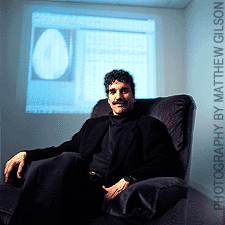John
Cacioppo:
Linking the mind and body
 A
new U of C professor pioneers
the field of social neuroscience, showing how biology and social
behavior interact.
A
new U of C professor pioneers
the field of social neuroscience, showing how biology and social
behavior interact.
 |
| Hardly
an armchair psychologist, John
Cacioppo tries out his lab from a subject's seat. |
From
the outside, the chamber looks like an industrial-size freezer
or a bank vault. But inside, the 8-foot-by-12-foot space is clearly
not intended to store meat or money. A La-Z-Boy recliner faces
a wall alternately flashing giant X's and O's beamed in by projector.
Behind the chair stand two narrow tables topped with an infrared
keyboard, vital-signs monitors, and a sleek red cap of electrodes
attached to multicolored wires. No noise gets in or out, as special
insulation blocks even the electrical signals emitted by lights.
The
chamber, located in the University's newly opened Biopsychological
Sciences Building, is one of the many sophisticated labs at the
disposal of John Cacioppo, the Tiffany and Margaret Blake distinguished
service professor in psychology. The studies he plans to conduct
in the chamber-and another lab just like it-may help answer such
questions as how the mind constructs racial prejudice and why
lonely people have greater health risks than those who are more
social.
Formerly
a professor at Ohio State University, his doctoral alma mater,
Cacioppo came to Chicago last year for the chance to help build
a social psychology program and the brand-new Institute for Mind
and Biology. Among the more than 20 piles of paper neatly stacked
across his desk and along the windowsill of his Kelly Hall office
are materials for a forthcoming Psychological Bulletin
paper and for an MIT Press book series that he's editing. Both
projects seek to advance the fledgling field of social neuroscience,
a discipline first described by Cacioppo and an Ohio State colleague
in 1992.
Social
neuroscience, explains Cacioppo, explores how the social world--which
sculpts human emotions, feelings, and interactions--affects the
brain and biology, and vice versa. As a practitioner, he aims
to get at a more integrated understanding of behavior, one that
connects an individual's thoughts and feelings to measurable changes
in brain activity and the body's overall health.
Both
scientists and lay people have long believed that the mind and
body can strongly influence each other. But, as Cacioppo and other
social-neuroscience forerunners--including the U of C's Martha
McClintock--point out in a draft of the upcoming Bulletin paper,
there have been few multilevel, longitudinal studies showing exactly
how genetic makeup, the brain's neural mechanisms, and social
influences may be linked.
At
last count the author or editor of seven academic books and 200-plus
research articles, Cacioppo has helped to lay a strong foundation
for the young discipline. Among other advances, he has posited
new theories of how the brain processes emotions and has tied
social contact to lower blood pressure. "There's a traditional
antipathy between biologists with their reliance on concrete anatomy
and social scientists with their emphasis on complex sets of abstractions
to explain behavior," he says. "But there's value in looking across
these levels of analysis."
Cacioppo
and his team of graduate and postdoctoral researchers--including
one who followed from Ohio State--have begun collecting data for
a multiyear study of loneliness in older adults. Concerned with
why loneliness has proven to be as unhealthy as obesity, high
cholesterol, and high blood pressure, they are working to pinpoint
its connections to sleep and stress-hormone levels.
In
a related effort, Cacioppo says he's close to explaining the nature
of loneliness, an understanding he hopes will help reduce its
negative health effects. He's now drafting findings from a four-year
study of young adults that show shyness is not an innate, unchangeable
personality trait, as many psychologists have long held, but rather
can be altered by treating an individual's perception of the world.
"If loneliness were due to an innate trait like height, there
wouldn't be much that could be done about it," he notes. "But
if it's more malleable, then we have to understand the processes
behind it to reduce it."
Cacioppo
also intends to further his nearly two decades of research into
what makes people desire to know, learn, and understand. "Just
like with exercise, some people think more effortlessly and enjoy
it more than others," he says. This spring, he'll study how 80
to 100 college students from Ohio State and Chicago respond via
keyboard to a variety of questions presented on a computer screen.
He's now working with other Chicago researchers to create a mathematical
algorithm that can account for both the speed and substance of
the subjects' responses, producing a statistical measure of their
cognitive abilities.
After
that, Cacioppo expects to begin a series of studies, lasting at
least two years, that will pursue how racial prejudices are formed.
In the first study, Cacioppo says, he will use special brain-wave
monitoring equipment and computer programs to track the neural
activity of 30 student volunteers as they respond to images and
facts about "greebles," a fictional group of organisms. "If we
can understand the psychological and neural means by which racial
prejudices form," he says, "then we can help diminish their negative
effects." --C.S.

![]()
